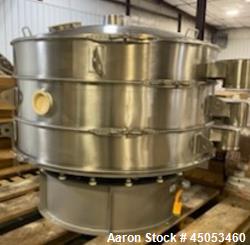Used Screeners & Sifters
Screeners and sifter machines are used to separate one particle or material from another. These machines are important in improving product quality and purity, therefore can be found in almost any facility where processing equipment is present.
Screening is a method of separating solid particles according to size alone. The agriculture, pharmaceutical, food, plastics, recycling, mining, and mineral processing industries all use screening for a variety of applications. Sifters are specifically used to separate wanted elements from unwanted material using woven screens such as a mesh or net. These pieces of equipment are traditionally used when processing dry bulk powders. Both screeners and sifters increase product quality and production yield, minimize investment costs, cut service downtime, and eliminate dust and fumes.
Aaron Equipment has a large inventory of reconditioned, unused, and used screeners and sifters. Aaron's inventory of screeners and sifters include circular screeners, dewatering incline screeners, rectangular screeners, and rotary screeners. If you are looking to sell your screener or sifter submit a request online or contact Erik Eichert at 630-238-7480.
The Right Shape For You: Understanding Circular, Rotary, and Rectangular Screeners
Industrial screeners are essential tools used across various sectors. They sort, separate, and size materials for efficient processing. Understanding the types of screeners is crucial for buyers. This guide explores circular, rotary, and rectangular screeners. Each type has unique features and applications. We will also discuss their benefits and maintenance tips.
This information is vital whether you work in food processing, waste management, or another industry. Let’s explore everything you need to know about industrial screeners.
What Are Industrial Screeners?
Industrial screeners, also known as screener sifters, are machines that separate materials based on size or other properties. They help efficiently process bulk materials and are vital in maintaining product quality and consistency.
Key Components of Industrial Screeners
- Screens or Sieves: The core component that separates materials based on size.
- Vibration Mechanism: Helps in the movement of materials across the screens.
- Motor: Powers the screener and facilitates vibration.
- Frame: Provides structural support to the entire system.
Types of Industrial Screeners
There are several types of screeners, each designed for specific applications and materials. Here, we will discuss the three main types: circular, rotary, and rectangular screeners.
- Circular Screeners - Circular screeners, sometimes known as circular vibratory screeners, are popular due to their versatility and efficiency. They use a circular motion to separate materials and are ideal for handling fine particles.
- Advantages of Circular Screeners:
- Versatility: Can handle a wide range of materials and particle sizes.
- Efficiency: Provides precise separation with minimal maintenance.
- Compact Design: Requires less floor space compared to other screeners.
- Advantages of Circular Screeners:
- Rotary Screeners - Rotary screeners, also known as trommels, use a rotating cylindrical screen to separate materials. They are especially useful for large particles and are often used in waste processing and recycling applications.
- Advantages of Rotary Screeners:
- Robustness: Suitable for heavy-duty applications.
- Effective for Large Particles: Ideal for sorting larger materials.
- Continuous Operation: Can handle high volumes of material efficiently.
- Advantages of Rotary Screeners:
- Rectangular Screeners - Rectangular screeners, or rectangular vibratory screeners, are known for their high capacity and ability to handle challenging materials. They use a back-and-forth motion to separate materials and are often used in industries requiring high throughput.
- Advantages of Rectangular Screeners
- High Capacity: Can process large volumes of material quickly.
- Customizable: Can be tailored to specific applications and material types.
- Ideal for Challenging Materials: Effective in handling sticky or abrasive materials.
- Advantages of Rectangular Screeners
Choosing the Right Industrial Screener
Selecting the appropriate screener for your needs involves considering several factors:
- Material Characteristics
- Particle Size: Determine the size range of materials you need to separate.
- Material Properties: Consider if materials are sticky, abrasive, or corrosive.
- Application Requirements
- Capacity Needs: Assess the volume of material you need to process.
- Precision: Consider how precise the separation needs to be.
- Operational Considerations
- Space Availability: Ensure you have enough space for the screener.
- Maintenance: Consider the maintenance needs and ease of access for components.
Benefits of Using Industrial Screeners
Industrial screeners offer numerous benefits that can enhance the efficiency and quality of your operations.
- Improved Product Quality - By ensuring precise separation, screeners help maintain consistent product quality, which is essential for customer satisfaction and regulatory compliance.
- Enhanced Efficiency - Screeners streamline the processing of materials, reducing labor costs and increasing throughput. This leads to more efficient operations and higher profitability.
- Versatility - With various types of screeners available, industries can find a solution tailored to their specific needs, whether they require separation of fine powders or large aggregates.
Maintenance and Care for Industrial Screeners
To ensure the longevity and efficiency of your industrial screeners, regular maintenance and care are crucial.
- Routine Inspections - Conduct regular inspections to check for wear and tear on screens, motors, and other components. This helps in identifying potential issues before they become significant problems.
- Cleaning - Regular cleaning of screens and other parts prevents material buildup, ensuring efficient operation and preventing contamination.
- Lubrication - Ensure that moving parts are adequately lubricated to minimize friction and wear.
Understanding the various types of industrial screeners, including circular, rotary, and rectangular screeners, is vital for any buyer looking to improve their material processing operations. By choosing the right screener and maintaining it properly, you can enhance product quality, efficiency, and versatility in your operations. Whether you need a screener for fine particles or heavy-duty applications, there's an industrial screener that fits your needs perfectly.
Incorporate these insights into your decision-making process to select the best screener for your industry and enjoy the benefits of optimized material separation.
